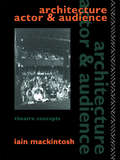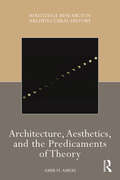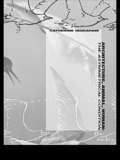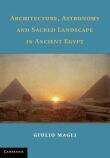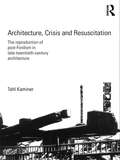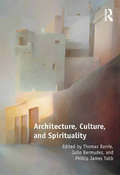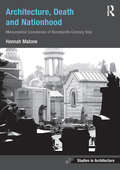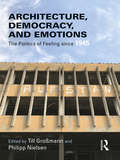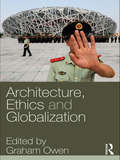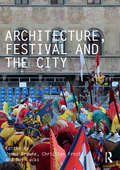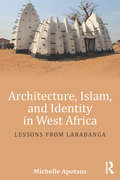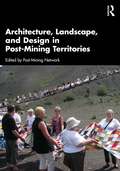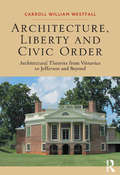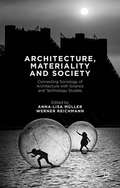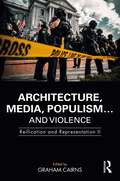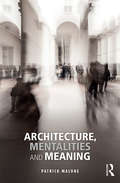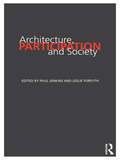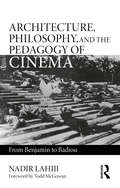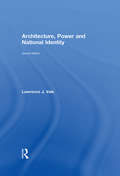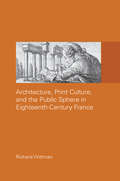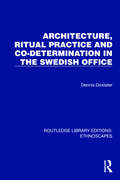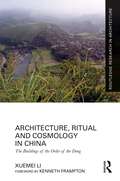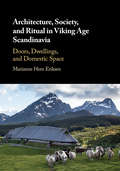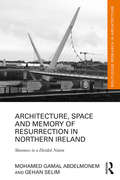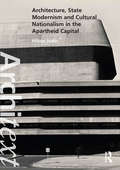- Table View
- List View
Architecture, Actor and Audience (Theatre Concepts)
by Iain MackintoshUnderstanding the theatre space on both the practical and theoretical level is becoming increasingly important to people working in drama, in whatever capacity. Theatre architecture is one of the most vital ingredients of the theatrical experience and one of the least discussed or understood. In Architecture, Actor and Audience Mackintosh explores the contribution the design of a theatre can make to the theatrical experience, and examines the failings of many modern theatres which despite vigorous defence from the architectural establishment remain unpopular with both audiences and theatre people. A fascinating and provocative book.
Architecture, Aesthetics, and the Predicaments of Theory (Routledge Research in Architectural History)
by Amir H AmeriArchitecture, Aesthetics, and the Predicaments of Theory offers a critical analysis of the methodological constants and shared critical strategies in the history of theoretical discourse on Western architecture. Central to these constants is the persistent role of aesthetics as a critical tool for the delimitation of architecture. This book analyzes the unceasing critical role aesthetics is given to play in the discourse of architecture. The book offers a close and critical reading of three seminal texts from three different periods in the history of theoretical discourse on Western architecture—the Renaissance, the Enlightenment, and 19th-century Romanticism. The first text is Leone Battista Alberti's Ten Books on Architecture of 1452, the next Marc-Antoine Laugier’s An Essay on Architecture of 1753, and last, John Ruskin’s The Seven Lamps of Architecture of 1849. Additional influential texts from, among others, the 20th and 21st centuries are engaged with along the way to locate and contextualize the arguments within the broader discursive tradition of Western architecture. The book will interest scholars and students of architecture, architectural history and theory, as well as scholars and students of cultural studies, aesthetic philosophy, art history, literary criticism, and related disciplines.
Architecture, Animal, Human: The Asymmetrical Condition
by Catherine T. IngrahamThis book looks at specific instances in the Renaissance, Enlightenment and our own time when architectural ideas and ideas of biological life come into close proximity with each other. These convergences are fascinating and complex, offering new insights into architecture and its role. Establishing architecture as a product of the ascendancy of the position of human life, the author shows here that while architecture is dependent on life forces for its existence, at the same time it must be, at some level, indifferent to the life within it. Life, for its part, privileges itself above all else, and seeks to continuously expand its field of expression. This, then, is the asymmetrical condition, and to understand it is to gain important new theoretical perspectives into the nature of architecture.
Architecture, Astronomy and Sacred Landscape in Ancient Egypt
by Giulio MagliThis book examines the interplay between astronomy and dynastic power in the course of ancient Egyptian history, focusing on the fundamental role of astronomy in the creation of the pyramids and the monumental temple and burial complexes. Bringing to bear the analytical tools of archaeoastronomy, a set of techniques and methods that enable modern scholars to better understand the thought, religion, and science of early civilizations, Giulio Magli provides in-depth analyses of the pyramid complexes at Giza, Abusir, Saqqara, and Dahshur, as well as of the Early Dynastic necropolis at Abydos and the magnificent new Kingdom Theban temples. Using a variety of data retrieved from study of the sky and measurements of the buildings, he reconstructs the visual, symbolic, and spiritual world of the ancient Egyptians and thereby establishes an intimate relationship among celestial cycles, topography, and architecture. He also shows how they were deployed in the ideology of the pharaoh's power in the course of Egyptian history.
Architecture, Crisis and Resuscitation: The Reproduction of Post-Fordism in Late-Twentieth-Century Architecture
by Tahl KaminerStudying the relation of architecture to society, this book explains the manner in which the discipline of architecture adjusted itself in order to satisfy new pressures by society. Consequently, it offers an understanding of contemporary conditions and phenomena, ranging from the ubiquity of landmark buildings to the celebrity status of architects. It concerns the period spanning from 1966 to the first years of the current century – a period which saw radical change in economy, politics, and culture and a period in which architecture radically transformed, substituting the alleged dreariness of modernism with spectacle.
Architecture, Culture, and Spirituality
by Thomas Barrie Julio BermudezArchitecture has long been understood as a cultural discipline able to articulate the human condition and lift the human spirit, yet the spirituality of architecture is rarely directly addressed in academic scholarship. The seventeen chapters provide a diverse range of perspectives, grouped according to topical themes: Being in the World; Sacred, Secular, and the Contemporary Condition; Symbolic Engagements; Sacred Landscapes; and Spirituality and the Designed Environment. Even though the authors’ approach the subject from a range of disciplines and theoretical positions, all share interests in the need to rediscover, redefine, or reclaim the sacred in everyday experience, scholarly analysis, and design.
Architecture, Death and Nationhood: Monumental Cemeteries of Nineteenth-Century Italy (Ashgate Studies in Architecture)
by Hannah MaloneIn the nineteenth century, new cemeteries were built in many Italian cities that were unique in scale and grandeur, and which became destinations on the Grand Tour. From the Middle Ages, the dead had been buried in churches and urban graveyards but, in the 1740s, a radical reform across Europe prohibited burial inside cities and led to the creation of suburban burial grounds. Italy’s nineteenth-century cemeteries were distinctive as monumental or architectural structures, rather than landscaped gardens. They represented a new building type that emerged in response to momentous changes in Italian politics, tied to the fight for independence and the creation of the nation-state. As the first survey of Italy’s monumental cemeteries, the book explores the relationship between architecture and politics, or how architecture is formed by political forces. As cities of the dead, cemeteries mirrored the spaces of the living. Against the backdrop of Italy’s unification, they conveyed the power of the new nation, efforts to construct an Italian identity, and conflicts between Church and state. Monumental cemeteries helped to foster the narratives and mentalities that shaped Italy as a new nation.
Architecture, Democracy and Emotions: The Politics of Feeling since 1945
by Till Großmann Philipp NielsenAfter 1945 it was not just Europe’s parliamentary buildings that promised to house democracy: hotels in Turkey and Dutch shopping malls proposed new democratic attitudes and feelings. Housing programs in the United Kingdom, the United States, and the Soviet Union were designed with the aim of creating new social relations among citizens and thus better, more equal societies. Architecture, Democracy, and Emotions focuses on these competing promises of consumer democracy, welfare democracy, and socialist democracy. Spanning from Turkey across Eastern and Western Europe to the United States, the chapters investigate the emotional politics of housing and representation during the height of the Cold War, as well as its aftermath post-1989. The book assembles detailed research on how the claims and aspirations of being "democratic" influenced the affects of architecture, and how these claims politicized space. Architecture, Democracy, and Emotions contributes to the study of Europe’s "democratic age" beyond Cold War divisions without diminishing political differences. The combination of an emotional history of democracy with an architectural history of emotions distinguishes the book’s approach from other recent investigations into the interconnection of mind, body, and space.
Architecture, Ethics and Globalization
by Graham OwenBridging the gap between architectural theory and professional practice studies, this book offers critical inquiry into the shifting ground of ethical thought in the changing climate of the global economy. Looking at issues of contemporary significance to architectural critics, practitioners, educators, and students, the book also examines the role of the architectural academy in providing an education in ethical judgement. Including transcripts of responses and discussions among its contributors, a broad interdisciplinary set of perspectives are debated and often controversial points of view are put forward.
Architecture, Festival and the City
by Jemma Browne Christian Frost Ray LucasHistorically the urban festival served as an occasion for affirming shared convictions and identities in the life of the city. Whether religious or civic in nature, these events provided tangible expressions of social, cultural, political, and religious cohesion, often reaffirming a particular shared ethos within diverse urban landscapes. Architecture has long served as a key aspect of this process exhibiting continuity in the flux of these representations through the parading of elaborate ceremonial floats, the construction of temporary buildings, the ‘dressing’ of existing urban space, the alternative occupations of the everyday, and the construction of new buildings and spaces which then become a part of the background fabric of the city. This book examines how festivals can be used as a lens to examine the relationship between city and citizen and questions whether this is fixed through time, or has been transformed as a response to changes in the modern urban condition. Architecture, Festival and the City looks at the multilayered nature of a diverse selection of festivals and the way they incorporate both orderly (authoritative) and disorderly (subversive) components. The aim is to reveal how the civic nature of urban space is utilised through festival to represent ideas of belonging and identity. Recent political and social gatherings also raise questions about the relationship of these events to ‘ritual’ and whether traditional practices can serve as meaningful references in the twenty-first century.
Architecture, Islam, and Identity in West Africa: Lessons from Larabanga
by Michelle ApotsosArchitecture, Islam, and Identity in West Africa shows you the relationship between architecture and Islamic identity in West Africa. The book looks broadly across Muslim West Africa and takes an in-depth study of the village of Larabanga, a small Muslim community in Northern Ghana, to help you see how the built environment encodes cultural history through form, material, and space, creating an architectural narrative that outlines the contours of this distinctive Muslim identity. Apotsos explores how modern technology, heritage, and tourism have increasingly affected the contemporary architectural character of this community, revealing the village’s current state of social, cultural, and spiritual flux. More than 60 black and white images illustrate how architectural components within this setting express the distinctive narratives, value systems, and realities that make up the unique composition of this Afro-Islamic community.
Architecture, Landscape, and Design in Post-Mining Territories
by Post-Mining NetworkThis edited collection explores how architects, planners, and landscape architects can engage with former mining sites and communities.Chapters investigate how to move from an extractivist system towards a territorialist project, working towards the reappropriation of territorial resources after centuries of subordination of local and immigrant populations. The first part reviews cases from European sites, including examples from France, Germany, and Romania that highlight intangible heritage as the subject of a territorial project. A special focus is placed on the coalfields of northern France, a UNESCO World Heritage site since 2012, where many experimental projects are being carried out. The second part explores the great American landscapes transformed by the extractive industry in the United States, Brazil, and Chile. Fully illustrated throughout, this book features photos showcasing architectural and landscape achievements, as well as drawings of future projects. Contributors respond to the design challenges of post-mining landscapes, foreshadowing new and varied transformative horizons. The cases present a rich and articulate collection of ‘on-the-ground’ projects.This book is essential for practitioners and students of architecture and urban planning, as well as associations and political and technical actors in post-mining communities.
Architecture, Liberty and Civic Order: Architectural Theories from Vitruvius to Jefferson and Beyond
by Carroll William WestfallThis book brings to light central topics that are neglected in current histories and theories of architecture and urbanism. These include the role of imitation in earlier centuries and its potential role in present practice; the necessary relationship between architecture, urbanism and the rural districts; and their counterpart in the civil order that builds and uses what is built. The narrative traces two models for the practice of architecture. One follows the ancient model in which the architect renders his service to serve the interests of others; it survives and is dominant in modernism. The other, first formulated in the fifteenth century by Leon Battista Alberti, has the architect use his talent in coordination with others to contribute to the common good of a republican civil order that seeks to protect its own liberty and that of its citizens. Palladio practiced this way, and so did Thomas Jefferson when he founded a uniquely American architecture, the counterpart to the nation’s founding. This narrative gives particular emphasis to the contrasting developments in architecture on the opposite sides of the English Channel. The book presents the value for clients and architects today and in the future of drawing on history and tradition. It stresses the importance, indeed, the urgency, of restoring traditional practices so that we can build just, beautiful, and sustainable cities and rural districts that will once again assist citizens in living not only abundantly but also well as they pursue their happiness.
Architecture, Materiality and Society
by Anna-Lisa Müller Werner ReichmannThis collection focuses on the interrelation of architecture and society. It examines the extent to which the insights of science and technology studies can be used to analyse the role of architecture in and for social life. The book's case studies deal with various aspects of social life: ethics, neighbourhood life, aging, perceptions and interpretations of the built environment, participation in design processes, interaction with and the adaptation of architecture. Architecture, Materiality and Society examines the question of whether architecture – and thus materiality as a whole – has agency. The book concludes with a thorough analysis of studies carried out so far on the interdependence of architecture and society, both from the field of science and technology studies and urban studies. Finally, it proposes a theoretical and methodological approach on how to research architecture's agency within society.
Architecture, Media, Populism… and Violence: Reification and Representation II
by Graham CairnsThe ‘Storming of the Capitol’ was, for many, the culminating media performance of the four-year presidency of Donald Trump. His presidency and its ‘final act’, bore all the hallmarks of a 21st century form of populism and media-politico spectacle that may yet come to dominate the political scene in the US, and worldwide, for years to come. The questions that such events raise are complex, varied and operative across a multitude of disciplines. This book engages with these vexed questions in the broad fields of politics and media, but does so, uniquely, through the prism of architecture. This book does not, however, limit its view to the recent events in Washington DC or the United States. Rather, it seeks to use those events as the starting point for a critique of architecture in the tapestry of mediated forms of protest and ‘political action’ more generally. Each chapter draws on case studies from across timeframes and across nations. The book sharpens our critique of the relationship between direct political action, its media representation and the role it assigns to architecture – as played out globally in the age of mass media. In doing so, it opens up broader debates about the past, present and future roles of architecture as a political tool in the context of international political systems now dominated by changing and unpredictable uses of media, and characterised by an increasingly volatile and at times violent form of political activism. It is essential reading for any student or researcher engaging with these questions.
Architecture, Mentalities and Meaning
by Patrick MaloneIn order to function, architectural theory and practice must be shaped to suit current cultural, economic, and political forces. Thus, architecture embodies reductive logic that conditions the treatment of human and social processes – which raises the question of how to define objectivity for architectural mentalities that must conform to a set of immediate conditions. This book focuses on meaning, and on the physical and mental processes that define life in built environments. The potential to draw knowledge from aesthetics, psychology, political economy, philosophy, geography, and sociology is offset by the fact that architectural logic is inevitably reductive, cultural, socio-economic, and political. However, despite the duty to conform, it is argued that the treatment of human processes, and the understanding of architectural mentalities, can benefit from interdisciplinary linkages, small freedoms, and cracks in a system of imperatives that can yield the means of greater objectivity. This is valuable reading for students and researchers interested in architectural theory as a working reality, and in the relationships between architecture and other fields.
Architecture, Participation and Society
by Paul Jenkins Leslie ForsythHow can architects best increase their engagement with building users and wider society to provide better architecture? Since the mid 1990s government policy has promoted the idea of greater social participation in the production and management of the built environment but there has been limited direction to the practising architect. Reviewing international cases and past experiences to analyze what lessons have been learnt, this book argues for participation within other related disciplines, and makes a set of recommendations for architectural practices and other key actors.
Architecture, Philosophy, and the Pedagogy of Cinema: From Benjamin to Badiou
by Nadir LahijiPhilosophers on the art of cinema mainly remain silent about architecture. Discussing cinema as ‘mass art’, they tend to forget that architecture, before cinema, was the only existing ‘mass art’. In this work author Nadir Lahiji proposes that the philosophical understanding of the collective human sensorium in the apparatus of perception must once again find its true training ground in architecture. Building art puts the collective mass in the position of an ‘expert critic’ who identifies themselves with the technical apparatus of architecture. Only then can architecture regain its status as ‘mass art’ and, as the book contends, only then can it resume its function as the only ‘artform’ that is designed for the political pedagogy of masses, which originally belonged to it in the period of modernity before the invention of cinema.
Architecture, Power and National Identity
by Lawrence ValeThe first edition of Architecture, Power, and National Identity, published in 1992, has become a classic, winning the prestigious Spiro Kostof award for the best book in architecture and urbanism. Lawrence Vale fully has fully updated the book, which focuses on the relationship between the design of national capitals across the world and the formation of national identity in modernity. Tied to this, it explains the role that architecture and planning play in the forceful assertion of state power. The book is truly international in scope, looking at capital cities in the United States, India, Brazil, Sri Lanka, Kuwait, Bangladesh, and Papua New Guinea.
Architecture, Print Culture and the Public Sphere in Eighteenth-Century France (The Classical Tradition in Architecture)
by Richard WittmanThis book focuses on the complex ways in which architectural practice, theory, patronage, and experience became modern with the rise of a mass public and a reconfigured public sphere between the end of the seventeenth century and the French Revolution. Presenting a fresh theoretical orientation and a large body of new primary research, this book offers a new cultural history of virtually all the major monuments of eighteenth-century Parisian architecture, with detailed analyses of the public debates that erupted around such Parisian monuments as the east facade of the Louvre, the Place Louis XV [the Place de la Concorde], and the church of Sainte-Genevieve [the Pantheon]. Depicting the passage of architecture into a mediatized public culture as a turning point, and interrogating it as a symptom of the distinctly modern configuration of individual, society, and space that emerged during this period, this study will interest readers well beyond the discipline of architectural history.
Architecture, Ritual Practice and Co-determination in the Swedish Office (Routledge Library Editions: Ethnoscapes)
by Dennis DoxtaterOriginally published in 1994, as part of the Ethnoscapes: Current Challenges in the Environmental Social Sciences series, reissued now with a new series introduction, Architecture, Ritual Practice and Co-determination in the Swedish Office is a case study of Swedish office buildings and examines how they have been influenced by spatial aspects of traditional culture in Scandinavia. It suggests a theoretical framework for architecture by casting the ritual form of Swedish offices into three distinct modes of expression.
Architecture, Ritual and Cosmology in China: The Buildings of the Order of the Dong (Routledge Research in Architecture)
by Xuemei LiDrawing on the author’s extensive fieldwork in the Dong areas in southwest China, this book presents a detailed picture of the Dong’s buildings and techniques, with new insights into the Dong’s cosmology and rituals of everyday life meshed with the architecture, and the symbolic meanings. It examines how the buildings and techniques of the Dong are ordered and influenced by the local culture and context. The timber bridges and drum towers are the Dong’s most prominent architectural monuments. Usually built elaborately with multiple roofs, these bridges and drum towers were designed and maintained by the local carpenters who also built the village suspended houses, in an oral tradition carried down from father to son or to apprentice. They were funded entirely by the local people, and the bridges tend to be built in places without great pressure of traffic or another bridge already existing close by. Why does such great expense go into the Dong’s buildings with elaboration? How were they built? And what do they mean to their users and builders? This book is an anthropological study on the Dong’s architecture and technique, and it aims to contribute a discourse on the interdisciplinary research area. It is suitable for graduate and postgraduate readers.
Architecture, Society, and Ritual in Viking Age Scandinavia: Doors, Dwellings, and Domestic Space
by Marianne Hem EriksenIn this book, Marianne Hem Eriksen explores the social organization of Viking Age Scandinavia through a study of domestic architecture, and in particular, the doorway. A highly charged architectural element, the door is not merely a practical, constructional solution. Doors control access, generate movement, and demark boundaries, yet also serve as potent ritual objects. For this study, Eriksen analyzes and interprets the archaeological data of house remains from Viking Age Norway, which are here synthesized for the first time. Using social approaches to architecture, she demonstrates how the domestic space of the Viking household, which could include masters and slaves, wives and mistresses, children and cattle, was not neutral. Quotidian and ritual interactions with, through, and orchestrated by doorways prove to be central to the production of a social world in the Viking Age. Eriksen's book challenges the male-dominated focus of research on the Vikings and expands research questions beyond topics of seaborne warriors, trade, and craft.
Architecture, Space and Memory of Resurrection in Northern Ireland: Shareness in a Divided Nation (Routledge Research in Architecture)
by Gehan Selim Mohamed Gamal AbdelmonemNorthern Ireland has a complex urbanism with multilayered socio-spatial politics. In this environment, issues of communication, self-representation and expression of identity are central to the experience of urban space and architecture where the dichotomy of division and shared living are spatially exercised in everyday life. Unlike other studies in the area, this book focuses on the everyday experiences of local communities in both public and private spheres - issues of ‘shareness’ - challenging conventional approaches to divided cities. The book aims to layer its narratives of architectural and social developments as an urban experience in post-conflict settings over the past two decades.
Architecture, State Modernism and Cultural Nationalism in the Apartheid Capital (Architext)
by Hilton JudinThis book is the first comprehensive investigation of the architecture of the apartheid state in the period of rapid economic growth and political repression from 1957 to 1966 when buildings took on an ideological role that was never remote from the increasingly dominant administrative, legislative and policing mechanisms of the regime. It considers how this process reflected the usurpation of a regional modernism and looks to contribute to wider discourses on international postwar modernism in architecture. Buildings in Pretoria that came to embody ambitions of the apartheid state for industrialisation and progress serve as case studies. These were widely acclaimed projects that embodied for apartheid officials the pursuit of modernisation but carried latent apprehensions of Afrikaners about their growing economic prospects and cultural estrangement in Africa. It is a less known and marginal story due to the dearth of material and documents buried in archives and untranslated documents. Many of the documents, drawings and photographs in the book are unpublished and include classified material and photographs from the National Nuclear Research Centre, negatives of 1960s from Pretoria News and documents and pamphlets from Afrikaner Broederbond archives. State architecture became the most iconic public manifestation of an evolving expression of white cultural identity as a new generation of architects in Pretoria took up the challenge of finding form to their prospects and beliefs. It was an opportunistic faith in Afrikaners who urgently needed to entrench their vulnerable and contested position on the African continent. The shift from provincial town to apartheid capital was swift and relentless. Little was left to stand in the way of the ambitions and aim of the state as people were uprooted and forcibly relocated, structures torn down and block upon block of administration towers and slabs erected across Pretoria. This book will be of great interest to students and scholars of architectural history as well as those with an interest in postcolonial studies, political science and social anthropology.
